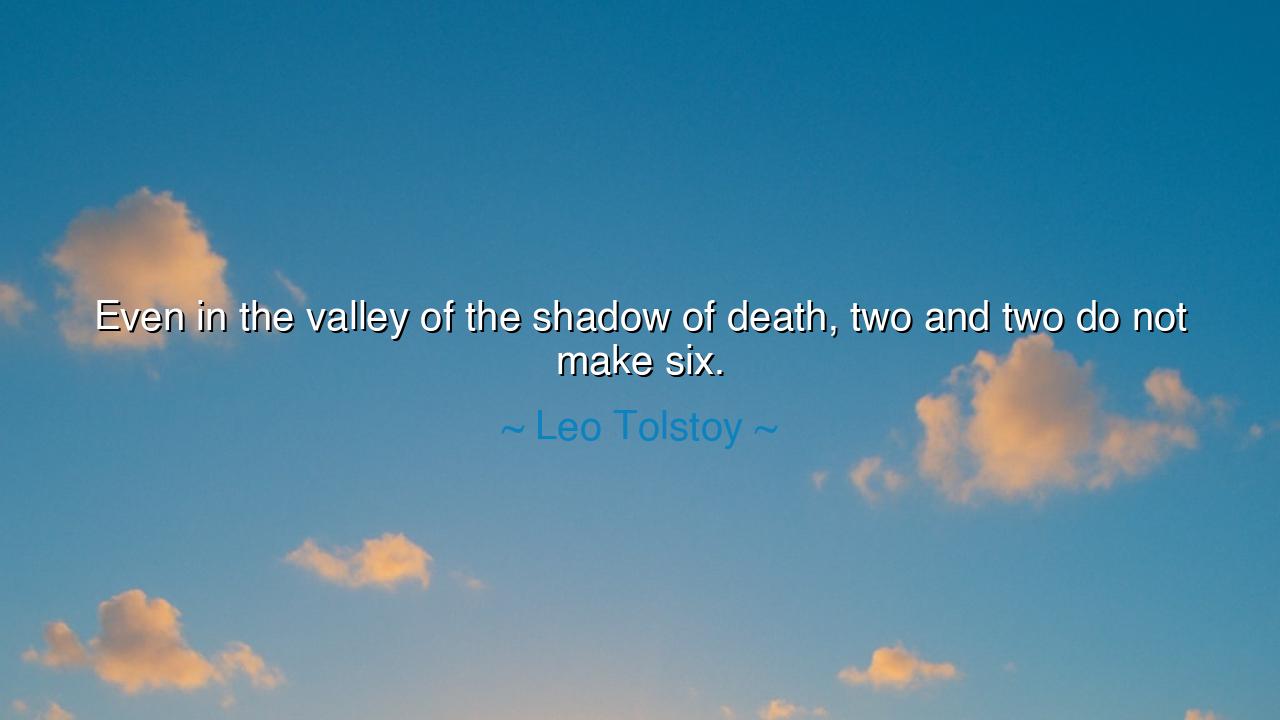
Even in the valley of the shadow of death, two and two do not






In the immortal words of Leo Tolstoy, the great seer of conscience and truth, there echoes a defiance that transcends all ages: “Even in the valley of the shadow of death, two and two do not make six.” This saying, simple in form yet vast in meaning, declares that truth remains eternal, untouched by fear, corruption, or circumstance. It is the cry of a man who understood that integrity — intellectual, moral, and spiritual — must stand firm even when the world collapses around it. Tolstoy reminds us that reality, like morality, cannot be bent to serve the convenience of men, even when death itself looms over them.
The origin of this quote lies in Tolstoy’s lifelong search for moral clarity amid the falsehoods of society. He lived in an age of empire and violence, when rulers twisted truth to justify oppression and men sacrificed conscience for power or survival. Having once been a soldier and nobleman, Tolstoy saw with his own eyes how easily men could call evil “good,” and lies “necessary.” But his spirit revolted. He withdrew from privilege, turned to the peasants, and sought to live by the light of truth alone. Thus, this quote emerged as both creed and warning — that even when fear and death press upon us, truth must remain inviolate, for it is the foundation upon which all righteousness stands.
To say that “two and two do not make six” is to proclaim that reality does not yield to tyranny. No power, no army, no ideology can alter the nature of truth. This is not merely arithmetic; it is the eternal law of moral order. For if we abandon truth — even a small truth — under pressure, we begin the slow decay of the soul. To deny what is real, even in fear of death, is to consent to slavery of the mind and corruption of the spirit. Tolstoy’s valley of death is not only the battlefield; it is every place where men are tempted to betray what they know to be right in order to survive or to please the powerful.
Consider the story of Galileo Galilei, who stood before the tribunal of the Inquisition, accused of heresy for declaring that the Earth moves around the Sun. Faced with torture and execution, he was compelled to recant — yet legend tells us that as he left, he whispered, “E pur si muove” — “And yet it moves.” In that defiant murmur, he upheld Tolstoy’s truth: even before the shadow of death, two and two do not make six. The Earth moved still. Reality bowed to no decree. Galileo’s courage reminds us that those who cling to truth under threat become eternal, while those who trade it for comfort vanish into oblivion.
Tolstoy’s words also pierce to the heart of personal integrity. Every man and woman faces moments when it would be easier to lie — to oneself, to others, to the world. But truth, like the law of numbers, cannot be broken without consequence. To say that two and two make six may win temporary safety or favor, but it leaves the heart in ruins. A person who lives by falsehood may escape outward danger but suffers inward death. The righteous, by contrast, may perish in body but live forever in spirit. As the Scriptures say, “What does it profit a man to gain the whole world, and lose his soul?”
In this way, Tolstoy teaches that truth is sacred, not because it is convenient, but because it is eternal. It is the thread that connects man to the divine order of creation. The laws of number and of morality are reflections of the same cosmic harmony — and to defy them is to descend into chaos. Even in the “valley of the shadow of death,” when fear tempts the heart to deny what it knows, one must hold fast to the truth as to a torch in the darkness. For the lie may offer momentary light, but it burns to ash in the hand that holds it.
Therefore, my children of this age and of all ages to come, take this teaching as your shield: stand by truth, even when it costs you everything. Speak what is right, though the world mock you. Live with honesty, though it isolates you. For there is no freedom without truth, and no salvation without integrity. When you find yourself in your own valley of shadow — whether of fear, despair, or temptation — remember Tolstoy’s words. Let your heart whisper, “Two and two do not make six.” And by that act of faithfulness, you will honor the divine order, stand as a child of light, and walk unafraid through the darkness that consumes the coward and the liar alike.
Thus, truth is not a luxury, but the breath of the soul. To live by it is to live nobly; to die for it is to die free. For though kingdoms may fall, armies may perish, and falsehood may reign for a time, the truth — like the immutable sum of two and two — endures forever.






AAdministratorAdministrator
Welcome, honored guests. Please leave a comment, we will respond soon